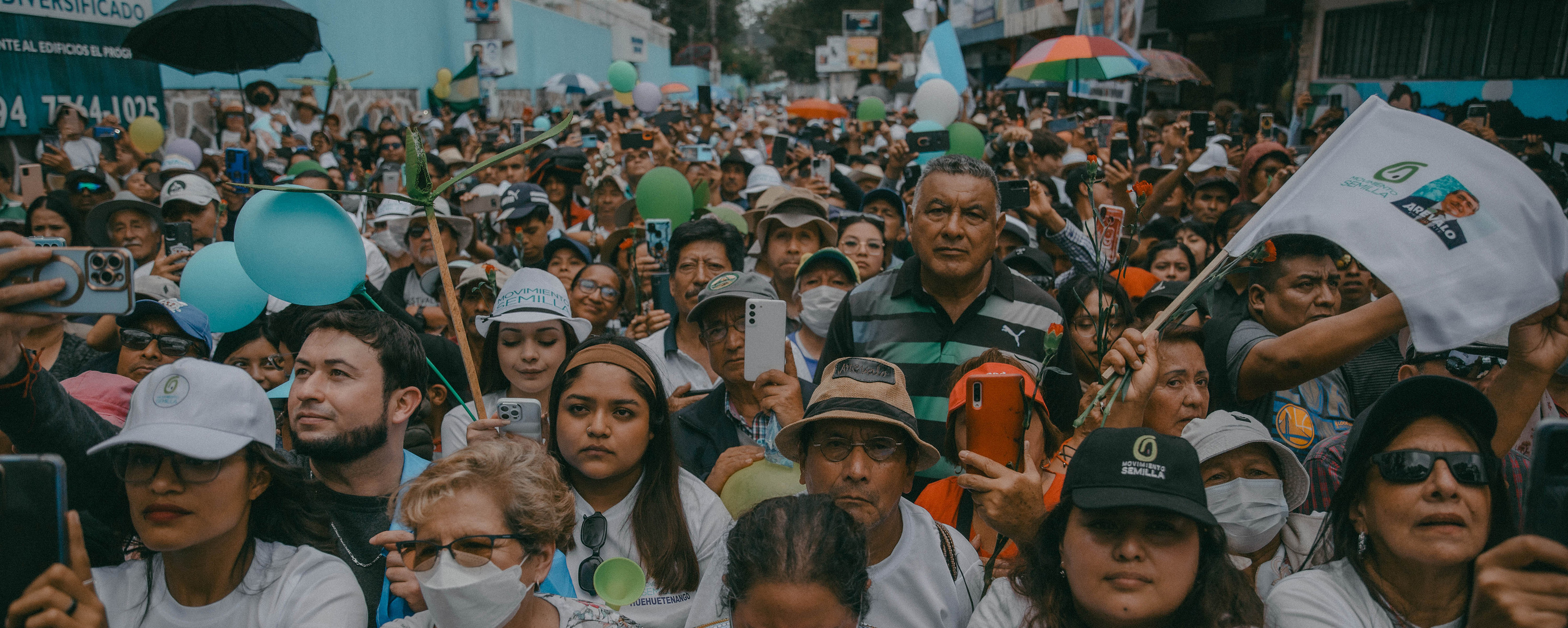If the defense of the election results in 2023 was critical to the survival of democracy in Guatemala, this year will determine the feasibility of structural reform. In May, the Guatemalan Congress will elect magistrates for key courts, including the Supreme Court of Justice (CSJ) and Appellate Courts (CA) judges. These represent more than 200 crucial posts across the justice system. In Latin America, only Bolivia and Honduras also select CSJ members in one same process, making it a political arm wrestle.
Knowing that anti-corruption change will only be possible by seizing the moment to dismantle the captured judiciary, on March 26, president Bernardo Arévalo made the unprecedented decision of requesting that the OAS send an observation mission to monitor the Supreme Court election. Not only the OAS but the whole international community should closely watch to see if the unexpected democratic turn last year extends beyond the presidency.
Guatemalan Supreme Court magistrates serve five-year terms. In the past two decades, the CSJ election process in Congress has been rife with evidence of influence-trafficking, politicization, and flagrant illegalities — so much so that the magistrates who should have completed their period in 2019 stayed on for four more years, facilitated by Congress repeatedly striking the court election from the agenda. Suddenly, last November, just two months before Arévalo took office, the legislature lurched forward, electing a new court to serve out the remaining year of the term. It appeared that outgoing legislators were trying to pack the Supreme Court with allies before inauguration day.
The appointments last year were made in minutes, without a public technical evaluation of candidates and with allegations of influence peddling again marring the nomination process, this time by ex-president Alejandro Giammattei’s closest political operator, Miguel Martínez. Among the new magistrates were people who had previously been investigated for corruption and undermining democratic processes. Now, political elites and parallel operators again plan to appoint and elect magistrates to secure their interests despite the change in government.
The Arévalo presidency miraculously survived anti-democratic attempts to overturn the August 2023 election even before assuming power, but his government is already hamstrung by a fractured Congress and a Supreme Court that just this month sent the legislature a request to revoke the immunity of the Supreme Electoral Tribunal magistrates who defended his inauguration. To rebuild an autonomous judicial branch, only dismantling the captured judiciary and ensuring that the rule of law is not gratuitous lip service will enable reform. Guaranteeing political rights, civil liberties, accountability mechanisms, affirming the political equality of all citizens, and constraining potential abuses of state power are the only ways to preserve Guatemalan democracy.
History has shown that Guatemalans have struggled to build peace in the four decades since democratization. Arévalo and his party Semilla face the challenge of dismantling the corrupt postwar public administration apparatus. Two judicial investigations in the last decade not only revealed systematic court-packing efforts by corrupt special interest groups but also reiterated that networks of politicians, magistrates, bureaucrats, business people, and lawyers who seek to perpetuate impunity are, then and now, present throughout Guatemala's institutional framework. It’s what the prosecutors called “Parallel Commissions,” a dark web of criminal networks wielding sweeping influence-peddling and judicial vote-buying.
For decades, the judicial system shielded itself from scrutiny by retaliating against those who investigate it. In the “Parallel Commissions 2020” case, the now-exiled anti-impunity prosecutor Juan Francisco Sandoval requested that ten magistrates' immunity be lifted. Those requests were systematically rejected. Erika Aifán, the High-Risk Tribunal judge assigned to the case, resigned citing threats to her life, and similarly left for exile in the United States.
Most of the magistrates identified in the investigations continue to sit on the benches of the CSJ and Constitutional Court. Many have been named in various versions of the U.S. State Department visa-shaming sanctions known as the ‘Engel List.’ Networks inside the justice system have even specialized in “offering” impunity services based on bureaucratic contacts. In a system corrupted and lacking judicial independence, citizens do not enjoy equality before the law, nor do they have the guarantees of being deprived of liberty, accused, or judged based on credible evidence. Judicial independence is a fundamental principle of the rule of law and a hallmark of democracy.
Today, over three months after Arevalo’s tumultuous inauguration day, the justice system remains actively aligned against him and his party. The Public Prosecutor’s Office continues legal harassment of Semilla and its congressional representatives. Persecution might even reach President Arévalo and Vice President Karin Herrera, who are still the subject of spurious criminal investigation.
Since last year's elections, Porras has sought to lift their immunity and declare the result null. This complicates the advance of a reformist agenda and represents the real opposition to the new government. Efforts to punish anti-corruption leaders continue, as dozens of justice operators remain in exile in Washington, Mexico City, and San José, Costa Rica. A renovated slate of independent judges, especially high court magistrates, could turn over a new leaf.
Guatemalans and international observers must take stock of the progress in a country that last year taught the world a valuable lesson: defense of democracy is possible, even when we least expect it. The bottom line is that the Guatemalan judiciary, as it currently stands, remains a paradoxical obstacle to the rule of law.
Timing is critical, especially when there is little faith in institutions to deliver short-term results and demonstrate that democracy can substantially improve people’s lives. People seeking legal remedies should get timely resolutions to their issues, whether it's challenging an unfair policy or resolving a dispute. When the judiciary is independent and seen as impartial, it bolsters confidence in the overall system. A decently-functioning judiciary would help ensure the government —as well as the political and economic elites— serve the people's interests, not their own.
Vaclav Masek Sánchez is a Guatemalan sociologist and columnist based in Los Angeles. Follow him at @_VaclavMasek on X/Twitter.

